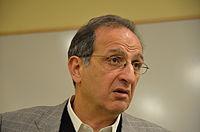Bradsher the Intrepid: ‘My times were good’
The public, of course, is the loser in this hollowing out of the information business.
The life of the “foreign correspondent”, that dream we had as youngsters, is becoming almost a relic of the distant past, like a B-movie with some actor pretending to be one of us.
As Henry S. Bradsher says with typical understatement in his new book The Dalai Lama’s Secret and Other Reporting Adventures (Louisiana State University Press), “Times have changed. My times were good.”
Bradsher, the epitome of the intrepid correspondent, has nailed it in two sentences. Those times were good for everyone.
He decided to become a foreign correspondent at age 12 or 13 and he never looked back. I was a late bloomer. I decided at 18. We met and worked together in Moscow in the 1960s, and we reveled in our important role of reporting and analysis of Cold War issues and their social context. He was my bureau chief for a year or two until he left to study at Harvard in the Nieman Fellowship program.
A Swiss colleague who knew him in New Delhi recalls trying to surprise him with a nugget of news that might interest The Associated Press. “I filed that three hours ago,” he enjoyed saying. Bradsher was always one step ahead of the competition.
Yes, times were good for the foreign correspondent and for the newspaper reader.
Bradsher’s new book is a collection of 26 self-standing vignettes describing some of the highlights of his long career, mainly in The AP and at the now-defunct Washington Star. He has created a unique format in the shape of non-fiction short stories that makes the book easy to read.
Chapter titles such as these will draw you in. “Stumbling Over a Policeman’s Severed Head”, “Tiger Hunting with Queen Elizabeth”, “Stabbed in the Back”, “Bombed in Moscow”, and “China’s Most Despicable”. He says he wrote these pieces over several years, deciding only recently to compile them in book form.
I found his memoir enlightening for the fact-packed accounts of major events in the 1960s and 1970s. It is also a tribute to a cohort of brave and adventurous individuals who placed themselves in personal danger – and continue to do so -- to get a story. He cites the Committee to Protect Journalists as the authority for tracking reporters’ deaths in action. As his book was printed, 926 journalists had died since 1992. The updated figure is 975 and climbing.
Bradsher in his low-key prose lets slip that he was pushed around shot at, but he was lucky. He escaped Cambodia and Vietnam without a scratch.
We forget how dangerous it was. Bradsher remembers. “Learning the hard way, journalists had developed some criteria for judging road dangers (in Cambodia). People working in the fields and looking relaxed in villages were good signs, as was oncoming traffic. But empty fields, tense or empty villages, and no approaching vehicles indicated danger …” From 1970 to 1975, 34 foreign journalists were killed or disappeared and were presumed dead. “Most were lost on Cambodia’s dangerous highways,” he writes.
On one of those roads, Bradsher’s friend and colleague Welles Hangen and his NBC camera crew were seized by Khmer Rouge and led away. Bradsher recalls: “Villagers later said Hangen and his crew were beaten to death three days after their capture.”
There is not much scope for humor in Bradsher’s telling. He always was a serious and intense writer-reporter. But he tells one story of traveling in Vietnam with Secretary of State William P. Rogers and assistant secretary for public affairs Michael Collins. Just a year earlier, Collins had been the astronaut who piloted Apollo 11 around the moon while his crew descended to the surface. Bradsher interrogated some farmers who had gathered and asked, through a translator, what they thought of Collins and his moon travel. Paraphrasing, Bradsher quotes a farmer, “About that man having been to the moon, well, we may just be ignorant farmers but we’re smart enough not to be fooled by that!”
The title story of the book relates to Bradsher’s reporting the secret treasure spirited out of Tibet by the Dalai Lama’s entourage while Bradsher was based in New Delhi for The AP. It was a sensitive secret and Bradsher’s story was greeted with skepticism. In the end, it was proven correct.
Later in his career, he was based in Hong Kong for the Star and earned a reputation for astute China-watching. With careful reading of documents from Beijing, Bradsher wrote early on about the fall of Lin Biao. He later reported Zhou en-Lai’s fading from the scene. The “China-watcher watchers” in Beijing at this point denounced as a “most despicable” correspondent. It was a label he wore with pride as he turned out to be right about the power struggles.
He resists boasting that his elder son has become an award-winning correspondent for the New York Times, also based in Hong Kong. Journalism is clearly in the genes.
The most moving chapter, for this reader, is “Hazards of Journalism”, which includes revisiting incidents many years later to see what happened to translators, editors and reporters he had known in difficult times. These were “men who suffered for being faithful reporters of things that powerful or unscrupulous men did not want reported”. One Afghan ended up driving a taxi in Washington, D.C. A Czech editor was banished to managing the heating system of an apartment complex. Others disappeared or were imprisoned.
When the Star finally went under in 1981, he considered offers to return to Asia but found that he and his family were ready to settle down in Washington. He was taken on by a branch of the CIA and again undertook “extensive travel on six continents”. His final touch: “My journalism career had ended. It had been a fascinating and enjoyable career.
Facts & Arts is a platform for owners of high quality content to distribute their content to a worldwide audience.
Facts & Arts' objective is to enhance the distribution of individual owners' content by combining various types of high quality content that can be assumed to interest the same audience. The thinking is that in this manner the individual pieces of content on Facts & Arts support the distribution of one another.
If you have fitting written material, classical music or videos; or if you would like to become one of our regular columnists, a book reviewer or music reviewer; or if you wish to market or broadcast a live event through Facts & Arts, please contact us at info@factsandarts.com.
This article is brought to you by the author who owns the copyright to the text.
Should you want to support the author’s creative work you can use the PayPal “Donate” button below.
Your donation is a transaction between you and the author. The proceeds go directly to the author’s PayPal account in full less PayPal’s commission.
Facts & Arts neither receives information about you, nor of your donation, nor does Facts & Arts receive a commission.
Facts & Arts does not pay the author, nor takes paid by the author, for the posting of the author's material on Facts & Arts. Facts & Arts finances its operations by selling advertising space.


















